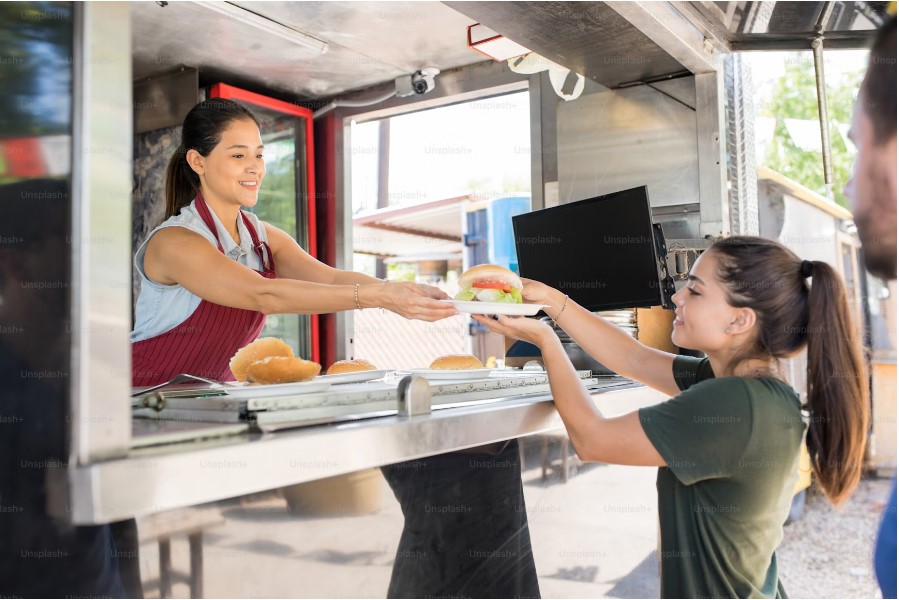What Technological Trends Affect the Food Truck Industry?
What technological trends affect the food truck industry? The food truck industry has grown rapidly in recent years, driven by mobility, convenience.
As competition intensifies and customer expectations rise, food truck operators must adapt to new technologies to remain competitive and efficient. This article delves into the technological trends that are transforming the food truck industry, from online ordering platforms to advanced kitchen equipment and data analytics.
The Rise of Online Ordering and Delivery Apps
What technological trends affect the food truck industry? One of the most significant technological advancements is the rise of online ordering and delivery apps. In today’s digital age, customers expect the ability to place orders quickly and conveniently from their smartphones. Food trucks have adopted online ordering platforms to streamline their operations and cater to a broader audience.
Platforms like Uber Eats, DoorDash, and Grubhub allow food truck owners to list their menus, accept orders in real-time, and deliver food to customers’ doorsteps. This expands a food truck’s reach beyond foot traffic and creates an opportunity to build a loyal customer base that may not have visited otherwise.
For instance, if a food truck is parked at a busy event or popular location, but the queue is too long or the location is difficult to reach, customers can place an order online and have it delivered straight to their homes or offices. This not only increases revenue but also ensures a steady flow of orders even when the truck is not physically at a location. What technological trends affect the food truck industry? This shift towards online ordering is one of the key advancements reshaping the industry.
Key Benefits of Online Ordering:
- Convenience for customers: Customers can easily place and pay for orders through an app or website.
- Increased sales: Food trucks can receive orders even when they’re not at a busy location or event.
- Enhanced customer experience: Customers appreciate the flexibility and the ability to track their orders in real-time.
For food truck operators, partnering with popular delivery apps is an effective way to tap into a larger customer base and increase revenue.
Point-of-Sale (POS) Systems
Efficient payment processing is a critical component for any food truck, and Point-of-Sale (POS) systems are helping improve both the customer and operational experience. What technological trends affect the food truck industry? Modern POS systems offer more than just transaction processing; they include features such as sales tracking, inventory management, and customer relationship management.
Food truck operators can now use mobile POS systems like Square or Toast, which provide the flexibility to accept payments both in-person and online. What technological trends affect the food truck industry? These systems also integrate with accounting software, making it easier to keep track of sales and expenses. Some POS systems even allow customers to tip directly through the app, which is a great way to boost employee morale.
Key Benefits of POS Systems:
- Faster transactions: Faster payment processing speeds up service and reduces wait times for customers.
- Integrated analytics: Provides real-time sales data, helping owners make informed business decisions.
- Inventory management: Automatically tracks ingredient levels, alerting operators when it’s time to restock.
By adopting POS systems, food truck owners can streamline their operations, provide excellent customer service, and ensure that financial data is organized and accessible.
Mobile Payment Solutions
With the rise of contactless payments, mobile payment solutions have become increasingly important in the food truck industry. Customers are looking for more convenient and secure ways to pay for their meals, which has led to the widespread adoption of mobile wallets such as Apple Pay, Google Pay, and Samsung Pay.
Mobile payment systems allow customers to pay quickly and securely without having to fumble for cash or cards. What technological trends affect the food truck industry? Additionally, some mobile payment systems offer loyalty programs that reward customers for repeat visits, further encouraging them to return.
For food trucks, adopting mobile payment solutions not only enhances the customer experience but also speeds up transactions, reducing long queues and wait times.
Key Benefits of Mobile Payment Solutions:
- Contactless payments: Reduces physical contact and helps ensure a safer transaction, especially in the post-pandemic era.
- Loyalty programs: Encourages repeat business by offering rewards for returning customers.
- Increased customer satisfaction: Faster, more convenient payment options enhance the overall experience.
By integrating mobile payment options, food trucks can cater to the tech-savvy customer while improving operational efficiency.
Kitchen Equipment Advancements
The kitchen equipment used by food trucks has seen a significant upgrade, with new technologies enhancing cooking efficiency and food quality. What technological trends affect the food truck industry? Advances in cooking appliances, refrigeration, and sanitation equipment have made it possible for food trucks to operate more like a restaurant while on the move.
Smart Kitchen Appliances:
Smart kitchen appliances, such as convection ovens, grills, fryers, and refrigerators, now come equipped with sensors and connectivity features. What technological trends affect the food truck industry? These appliances can be controlled remotely via apps, allowing food truck operators to monitor cooking processes and adjust settings in real-time. This results in more consistent food quality and energy efficiency.
For example, a food truck’s fryer may be equipped with a temperature sensor that ensures the oil is always at the right temperature, leading to perfectly cooked food every time. Additionally, smart refrigerators alert the operator when temperatures rise or fall outside of optimal ranges, preventing spoilage and reducing food waste.
Key Benefits of Advanced Kitchen Equipment:
- Energy efficiency: New appliances use less energy, reducing operating costs.
- Consistent food quality: Sensors ensure food is cooked to perfection every time.
- Better food safety: Smart refrigerators and freezers monitor temperature and alert operators if something goes wrong.
With improved kitchen equipment, food trucks can deliver high-quality food more efficiently and reduce the risk of equipment failure.
Data Analytics and Customer Insights
Data is one of the most powerful tools available to food truck operators today. What technological trends affect the food truck industry? With the help of data analytics, food trucks can gather valuable insights into customer preferences, sales trends, and operational performance. This allows them to make data-driven decisions that can improve the overall business.
For instance, by analyzing sales data from their POS system, food truck operators can identify which menu items are the most popular and profitable. This allows them to adjust their menu offerings, focus on high-demand dishes, and even offer personalized promotions based on customer preferences.
Moreover, data analytics helps food trucks optimize their locations. By using location-based data, food trucks can determine which areas have the highest demand and plan their routes accordingly, ensuring they’re always in the right place at the right time.
Key Benefits of Data Analytics:
- Customer insights: Understand what customers want and tailor the menu accordingly.
- Optimized operations: Identify inefficiencies in the supply chain and improve service times.
- Targeted marketing: Use data to create personalized marketing campaigns that resonate with customers.
Leveraging data analytics is key to maintaining a competitive edge in the crowded food truck industry.
Social Media and Digital Marketing
In the world of food trucks, effective marketing is essential. Social media platforms like Instagram, Facebook, and Twitter have become invaluable tools for food truck operators to connect with customers, promote special events, and share new menu items. These platforms provide a direct line to customers, allowing operators to engage with their audience in real time.
Food truck operators can also use social media to post real-time location updates, ensuring that their customers know exactly where to find them. Tools like Google My Business allow food truck owners to list their locations, hours of operation, and contact details, making it easier for customers to discover them.
Moreover, digital marketing strategies like email marketing and pay-per-click (PPC) advertising can drive more traffic to a food truck’s website or social media profiles, helping them attract new customers and build brand loyalty.
Key Benefits of Social Media and Digital Marketing:
- Increased visibility: Promoting a food truck online increases brand awareness.
- Real-time engagement: Food trucks can directly communicate with their customers.
- Targeted advertising: Reach specific customer segments through online ads and promotions.
Effective use of social media and digital marketing is a must for food trucks looking to stand out in a competitive market.
Sustainable Technology and Eco-friendly Practices
As customers become more environmentally conscious, many food trucks are embracing sustainable technologies and practices to reduce their carbon footprint. These include using biodegradable packaging, solar-powered equipment, and energy-efficient cooking appliances.
For example, food trucks are increasingly using compostable containers and utensils made from plant-based materials instead of plastic. Solar panels can be installed on the roof of a food truck to power lights and small appliances, reducing reliance on traditional fuel sources.
Sustainability isn’t just good for the planet; it’s also an effective marketing tool. Many customers are willing to pay a little extra for eco-friendly food options, and promoting sustainable practices can help a food truck build a loyal, environmentally-conscious customer base.
Key Benefits of Sustainable Technology:
- Environmental impact: Reduce the carbon footprint and waste produced by the food truck.
- Cost savings: Solar panels and energy-efficient appliances can help reduce energy costs.
- Brand differentiation: Stand out by offering eco-friendly options and practices.
Embracing sustainability not only helps the environment but can also create a strong connection with customers who prioritize green practices.
Conclusion
Technological trends are profoundly reshaping the food truck industry, from mobile payments and smart kitchen appliances to data analytics and sustainable practices. Food truck owners who embrace these advancements are better positioned to enhance the customer experience, streamline operations, and stay competitive in a crowded market.
As the food truck industry continues to evolve, staying up-to-date with the latest technologies will be key to success. By leveraging these trends, food truck operators can create more efficient, enjoyable, and profitable businesses while keeping customers satisfied and engaged.
By embracing these trends and adapting to new technologies, food trucks can ensure their growth and success in an ever-changing market.





